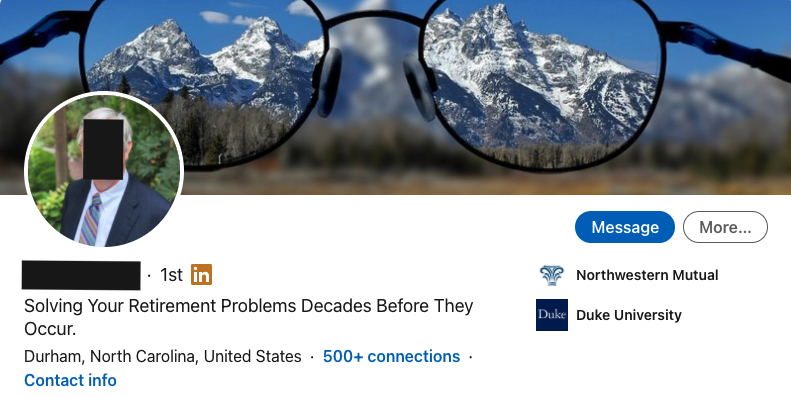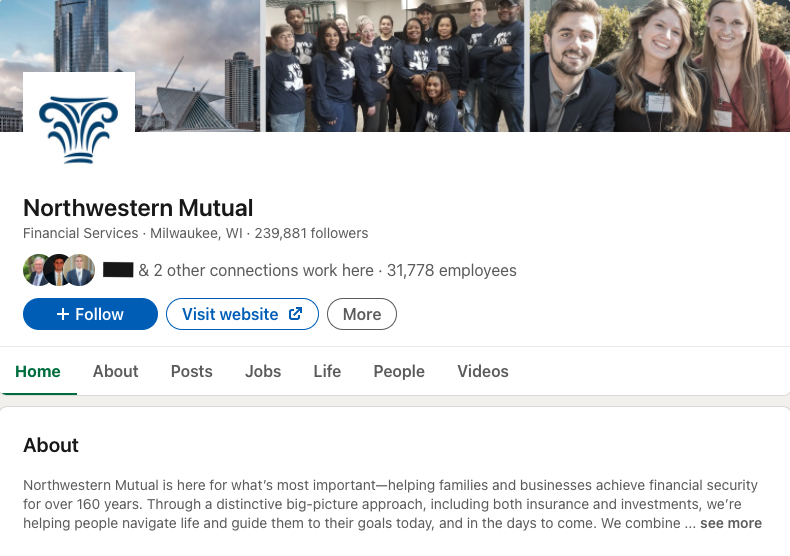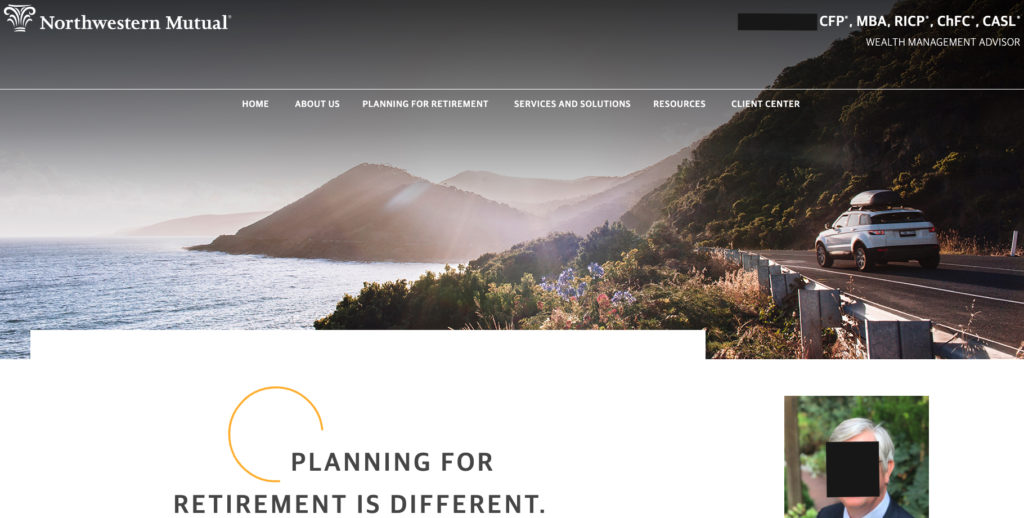B2B Breakdown Series – Episode I: LinkedIn Outreach
If you’ve done any sort of B2B marketing, you know how difficult it can be to get in touch with someone — or even the right someone. It takes multiple touches to even warm up a lead, and any missteps could get you permanently labeled a spammer.
Because B2B marketing relies heavily on cold outreach, it’s crucial to make sure that you’re sending the right types of messages. LinkedIn is a popular platform for this type of outreach, but as on any social network, cold messages are a risky tactic! Let’s look at an outreach attempt we received and see what could have made it more successful.
Review of Initial Outreach

We received a LinkedIn outreach message from Tom Morris from Northwestern Mutual. We had initially connected with Tom on August 16, 2018. Nearly two years later, Tom sent us a message that begins “It’s been a while since we last connected.” He then mentioned how rough 2020 had been. This was a bit of a generic spiel, but we did appreciate Tom reaching out to us.
However, the intent of his message wasn’t quite clear. He said that he is “glad to be a resource,” but doesn’t clarify what that would entail. Then, he immediately asked when would be a good time for a call. While we appreciate his confidence, it is unclear what he is offering. What will the call accomplish? Why should we give up our limited time?
Tom also did not provide a link to schedule a call, nor any suggested dates or times. Weeks passed, and while we were uncertain what the next steps could be, we never heard from Tom again. Followups are always helpful because some prospects genuinely do miss the initial messages. Tom could have made sure that he connected with us by sending a follow-up.
While Tom’s strategy came from the right place, his message didn’t speak to our unique needs. He left too much responsibility in our hands, and we now had to research him and track him down.
So, what happens when you check out Tom Morris?
Review of LinkedIn Profile

Tom Morris’s profile isn’t bad at first glance — but as you look further, you might start to wonder what he was messaging about. It’s a bit hard to make an emotional connection because his headshot is somewhat zoomed out, and his cover image, while neat-looking, doesn’t give any more clues about his offerings.
Tom does have a decent headline that expresses his value proposition:
“Solving Your Retirement Problems Decade Before They Occur.” We now know more about what he does, but this headline doesn’t speak to his target audience. Why were we chosen as a prospect? What information should we prepare before reaching out to Tom? The more of these questions you can answer for your prospects, the better.
Scrolling down his profile, we see more problems. While Tom is very active on LinkedIn and has an impressive number of followers, he doesn’t have a lot of information about his career. Most of his job descriptions are blank, and he has only four recommendations. We’re certain that he’s had many more happy clients and colleagues — but it’s harder for us to imagine ourselves working with him because we don’t see a lot of feedback from other people.
Review of LinkedIn Company Page

Most of us have heard of Northwestern Mutual, but let’s say we haven’t — or that we want to learn more about it. When you click on their company page on LinkedIn, everything is very vague and company-focused. Their About section is incredibly verbose; it goes on and on about their values and accolades. We imagine they’re focused on recruiting employees — but they’ve forgotten that their agents are cold-messaging prospects as well! Your company page needs to speak to your audience more than it sings your own praises.
It’s just not clear what Tom wanted to achieve by booking a call. We get the sense he wanted to help us plan for retirement — but what’s unique about his offering? What is the most compelling reason that we should take time out of our day to hunt down Tom and figure out what value he has to provide? Had Tom hinted at this in his message, we would be more likely to respond.
Review of Website

Let’s say that you still wanted to get in touch with Tom. When you click on the “Contact Info” link on his LinkedIn profile, not one, not two, but three websites pop up. Which do you choose? Well, the second mentions “disclosures” and the other mentions “social media guidelines.” We’re not sure what to do with those links. It’s essentially his CTA yet doesn’t give you a clear path. As you know, B2B marketing requires clarity, or else you risk losing the prospect to… pretty much anything else.
If you click on Tom’s top link labeled “personal website,” you go to what is clearly a Northwestern Mutual page. Not only is the page extremely text-heavy, but it’s also still not clear what Tom is offering you. There is not much content above-the-fold, and instead of clarifying his offerings, the page dives into some aspirational text about climbing mountains and looking to the horizon.
We would much rather learn more about Tom! He reached out to us to make a human connection, yet his personal website is more focused on Northwestern Mutual. We’re still not sure what practical takeaways we can expect. In B2B outreach, you must let that authentic humanity shine through. That’s what makes a difference between a random cold message and one that piques our interest.
There’s still no clear way to book a call with Tom, and we don’t want to swap a bunch of LinkedIn messages trying to find a time. When you do click the “Contact Me” button, you get a long-form asking for your name, age, financial goals, name of your first-born…it’s just too much. This is obviously a standard Northwestern Mutual form, but ideally, the prospect does not have to do so much work to connect with someone.
Wrapping Up
Tom did some things very well. He reached out with a relevant message and offered to be a resource. His LinkedIn profile included a compelling headline and a link to his professional website. Everything else, though, is a bit vague and generic. We know Tom may have something we’d like to hear about, and if he targeted us, he may understand our pain points and has a solution for us.
Unfortunately, that’s just not clear from the single message and the overall tone of his digital presence. He leaves a lot of the work up to us rather than clearly explaining what value he would provide. He essentially knocked on the door and left his card, when he should have clearly expressed why we should talk to him. B2B marketing is all about trust and value, so when you are creating your outreach strategy, make sure to make that human connection as authentic and easy as possible!
